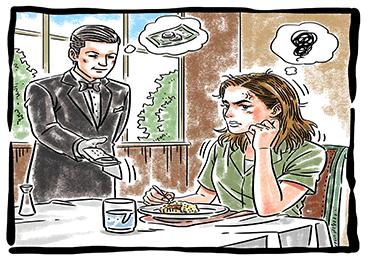s an American who grew up in a country where tipping is practically mandatory – where you’re expected to add 15-20 percent to every restaurant bill, tip your barista, tip your grocery checkout person, and even guilt-tip at self-service kiosks (a concept that I still don’t understand because if I’m doing the work, shouldn’t I be the one getting the tip?), you’d think I’d be used to it, but I’m not. On top of it, I’m a people pleaser who’s constantly worried that I’m under-tipping every single time I dine out.
But not here. Dining out in China feels like a breath of fresh air. Here, there’s no awkward math at the end of a meal, no anxiety over whether you tipped enough, and no judgment from servers expecting extra money. And you know what? It’s better this way.
In the US, the listed price on a menu is not what you’re actually paying for. By the time you add tax, which varies by state, and tip, your US$20 meal suddenly costs US$25 or more. In China, what you see is what you pay. There’s no mental gymnastics trying to calculate percentages, no pressure to “round up” to avoid looking cheap, and no fear of getting chased down by a server because you “only” left 12 percent instead of 20 percent.
I didn’t realize this until a friend explained it to me, but in the US, the state minimum wage law doesn’t actually apply certain occupations like restaurant waiters. They’re paid as little as US$2.13 an hour (which is the federal minimum wage) because tips are expected to make up the difference. This puts the burden on customers to ensure workers earn a living wage, a system that’s awkward for both diners and employees. It’s also why in the US you get over the top enthusiastic servers checking in on you every few minutes. But to be completely fair, depending on what type of establishment someone is working at, they can very much be making more than the state minimum wage based on the generosity of their clientele.
To me, it always felt like waiters in the US are faking niceness for a few extra bucks at the end of the meal. But here, waiters are helpful without putting on an act. If you need something, you can ask; if you don’t, they won’t interrupt your meal every five minutes. It’s a more relaxed, respectful way to dine. Who likes having a stranger interrupt their conversations and those obligatory small talks?
In China, restaurant staff are paid regular salaries, and in many cases, the restaurant also provides them with staff meals and housing. They don’t rely on tips to survive, which means they don’t have to perform exaggerated friendliness or hover over your table hoping for a bigger payout. Service is still efficient and professional, but it’s not transactional. It’s not a practice that’s exclusive to China, in fact, the whole tipping culture is the oddball out. In other Asian countries and countries in Europe, waiters don’t expect you to leave a tip either because they’re all paid decent wages.
The tipping culture in the US has actually made me hate dining out. If you go somewhere where the service is terrible, you’re still obligated to tip. But what are you paying for then? I’ve once had a waiter who angrily delivered my food without a word, then returned to the counter where she continued to pick her nose while looking off into space. That time, we were so grossed out that we left without leaving a tip. And as we walked a step out of the restaurant, she came running out asking why there was no tip.
And many restaurants nowadays will do the math for you and print it on the bottom of your bill. You’re given options for tipping 15, 20, 30 or 50 percent. If you’re expecting me to shell out money already, why not just add it to the price of the food and save us the hassle of the math and guilt challenge?
China’s no-tipping culture proves that restaurants can function just fine, actually, better by not forcing customers to subsidize workers’ wages. It makes people pleasers like me feel at ease when I can leave a restaurant without wondering if I under-tipped or over-tipped, and it saves waiters the mental exhaustion of having to make small talk with strangers every shift.

 Old Version
Old Version